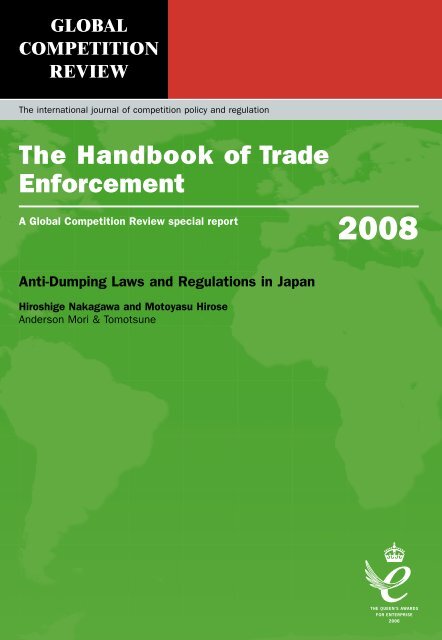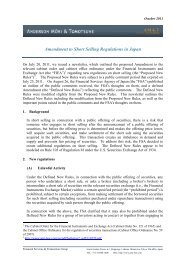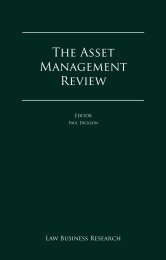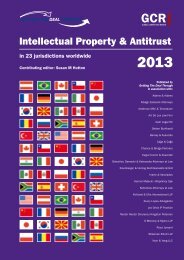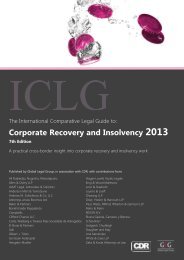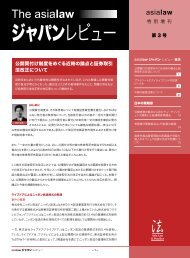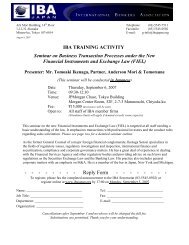Anti-Dumping Laws and Regulations in Japan
Anti-Dumping Laws and Regulations in Japan
Anti-Dumping Laws and Regulations in Japan
Create successful ePaper yourself
Turn your PDF publications into a flip-book with our unique Google optimized e-Paper software.
GlobaLCompetitionReviewThe <strong>in</strong>ternational journal of competition policy <strong>and</strong> regulationThe H<strong>and</strong>book of TradeEnforcementA Global Competition Review special report2008<strong>Anti</strong>-<strong>Dump<strong>in</strong>g</strong> <strong>Laws</strong> <strong>and</strong> <strong>Regulations</strong> <strong>in</strong> <strong>Japan</strong>Hiroshige Nakagawa <strong>and</strong> Motoyasu HiroseAnderson Mori & Tomotsune
japan<strong>Anti</strong>-<strong>Dump<strong>in</strong>g</strong> <strong>Laws</strong> <strong>and</strong> <strong>Regulations</strong> <strong>in</strong> <strong>Japan</strong>Hiroshige Nakagawa <strong>and</strong> Motoyasu HiroseAnderson Mori & TomotsuneIn <strong>Japan</strong>, general anti-dump<strong>in</strong>g legislation isprovided by article 8 of the Customs <strong>and</strong> TariffLaw (Law No. 54 of 1910, kanzei teiritsu hou <strong>in</strong><strong>Japan</strong>ese), whereas specific details are provided<strong>in</strong> Ord<strong>in</strong>ance No. 416 of 1994 <strong>and</strong> the guidel<strong>in</strong>esthereunder. All of these laws <strong>and</strong> regulations arepromulgated <strong>in</strong> accordance with the rules of theWorld Trade Organization (WTO), which havebeen ratified by the <strong>Japan</strong>ese government.Case precedentsIn <strong>Japan</strong>, until recently, the government had beenrather passive <strong>in</strong> deal<strong>in</strong>g with the imposition ofanti-dump<strong>in</strong>g duties (AD duties). The <strong>Japan</strong>esegovernment has only ever made three f<strong>in</strong>aldeterm<strong>in</strong>ations to impose an anti-dump<strong>in</strong>g duty:concern<strong>in</strong>g ferrosilicon manganese from Ch<strong>in</strong>a,South Africa <strong>and</strong> Norway <strong>in</strong> 1993; concern<strong>in</strong>gcotton yarns from Pakistan <strong>in</strong> 1995; <strong>and</strong> concern<strong>in</strong>gpolyester staple fibres from Korea <strong>and</strong> Ch<strong>in</strong>eseTaipei <strong>in</strong> 2002. As of March 2008, there is onepend<strong>in</strong>g anti-dump<strong>in</strong>g <strong>in</strong>vestigation concern<strong>in</strong>gelectronic manganese ore exported from Australia,South Africa, Ch<strong>in</strong>a <strong>and</strong> Spa<strong>in</strong>.In all of the three cases, the <strong>Japan</strong>ese government<strong>in</strong>variably established that the <strong>in</strong>vestigated productdumped <strong>in</strong>to <strong>Japan</strong> caused <strong>in</strong>jury to the <strong>in</strong>dustry of<strong>Japan</strong>, <strong>and</strong> consequently the AD duties were leviedaga<strong>in</strong>st the importer of the <strong>in</strong>vestigated products.Although at least some of the <strong>in</strong>terested partiesanswered to the compla<strong>in</strong>t filed by the applicants<strong>in</strong> these cases, they were not always successful<strong>in</strong> defend<strong>in</strong>g their position. The ferrosiliconmanganese case <strong>in</strong> 1993 is the only case <strong>in</strong> historywhere some <strong>in</strong>terested parties successfully executeda price undertak<strong>in</strong>g with the <strong>Japan</strong>ese government.The marg<strong>in</strong> of dump<strong>in</strong>g f<strong>in</strong>ally determ<strong>in</strong>ed by the<strong>Japan</strong>ese government may turn out to be higherthan the marg<strong>in</strong> <strong>in</strong>itially alleged by the applicant,although s<strong>in</strong>cere cooperation with the <strong>Japan</strong>esegovernment’s <strong>in</strong>vestigation will likely lead to morefavourable consequences.General rulesArticle 8 of the Customs <strong>and</strong> Tariff Law <strong>and</strong>the related government ord<strong>in</strong>ance providefor the basic rules on the imposition of ADduties under <strong>Japan</strong>ese law, <strong>in</strong> accordance withthe WTO rules.AD duties will be imposed aga<strong>in</strong>st the importerof a product <strong>in</strong>to <strong>Japan</strong> when the importationof the product would cause its sale price to fallbelow the normal value of the product, <strong>and</strong> suchimportation causes <strong>in</strong>jury to the <strong>in</strong>dustry of <strong>Japan</strong>.However, the methodology for determ<strong>in</strong>ation ofthe normal value of a product is not clearlydef<strong>in</strong>ed <strong>in</strong> any of <strong>Japan</strong>’s anti-dump<strong>in</strong>g laws orregulations. Generally, the domestic sales priceof the <strong>in</strong>vestigated product (<strong>in</strong>clud<strong>in</strong>g similarproducts, if any) dest<strong>in</strong>ed for consumption <strong>in</strong> itscountry of orig<strong>in</strong> will be regarded as the normalvalue. However, if there are no domestic sales ofthe product, the constructed value or, alternatively,its export price to a third country shall bereferenced as the normal value.ProceduresThe M<strong>in</strong>istry of F<strong>in</strong>ance (MoF) <strong>and</strong> M<strong>in</strong>istry ofEconomy, Trade <strong>and</strong> Industry (METI), the twoauthorities <strong>in</strong> charge of anti-dump<strong>in</strong>g measures<strong>in</strong> <strong>Japan</strong>, give a public notice (kokuji) upontheir determ<strong>in</strong>ation to <strong>in</strong>itiate an anti-dump<strong>in</strong>g<strong>in</strong>vestigation concern<strong>in</strong>g a product imported <strong>in</strong>to<strong>Japan</strong>. Then, the MoF <strong>and</strong> the METI will issuea questionnaire to the <strong>in</strong>terested parties such asexporters, importers <strong>and</strong> <strong>in</strong>dustrial users of theproduct.In this regard, while the anti-dump<strong>in</strong>gregulations <strong>in</strong> <strong>Japan</strong> are consistent with the<strong>in</strong>ternational st<strong>and</strong>ards such as the AD Agreement,the specific rules under those regulations are notdef<strong>in</strong>ed <strong>in</strong> detail, possibly due to the lack of caseprecedents.The questionnaire for the exporter consists ofseveral items, <strong>in</strong>clud<strong>in</strong>g the general <strong>and</strong> f<strong>in</strong>ancial<strong>in</strong>formation of the company, the amount of salesdest<strong>in</strong>ed for domestic consumption <strong>in</strong> the countryof orig<strong>in</strong> <strong>and</strong> the amount of exports to <strong>Japan</strong> <strong>and</strong>to other countries. The respondent will be requiredto provide data on a variety of cost items forspecific, <strong>in</strong>dividual purchases <strong>and</strong>/or sales relat<strong>in</strong>gto the <strong>in</strong>vestigated products., which <strong>in</strong>clude suchJwww.globalcompetitionreview.com 73
japanJadjustment items as pack<strong>in</strong>g, freight, warehous<strong>in</strong>g<strong>and</strong> technical costs, among others.The difficulties <strong>in</strong> comply<strong>in</strong>g with anti-dump<strong>in</strong>gregulations <strong>in</strong> <strong>Japan</strong> consist of the follow<strong>in</strong>g: it isnecessary for non-<strong>Japan</strong>ese respondents not onlyto collect <strong>in</strong>formation to answer the questionsbut also to translate all <strong>Japan</strong>ese documents <strong>in</strong>toEnglish (<strong>and</strong> vice versa) by the deadl<strong>in</strong>e set out bythe MoF <strong>and</strong> the METI, as is the case with otherAsian countries where English is not used as anofficial language. In theory, the <strong>in</strong>terested partiesare entitled to solicit an extension of the deadl<strong>in</strong>e;however, as a matter of practice, the <strong>Japan</strong>esegovernment will not respond to such request ona flexible basis. Furthermore, s<strong>in</strong>ce the whole ofthe procedure, <strong>in</strong>clud<strong>in</strong>g the questionnaire <strong>and</strong>response, is all <strong>in</strong> <strong>Japan</strong>ese, it requires considerabletime <strong>and</strong> language skills for foreign companies tocommunicate with the <strong>Japan</strong>ese government. Inorder to follow the procedures properly, consider<strong>in</strong>gthe huge volume of translation requir<strong>in</strong>g consistentterm<strong>in</strong>ology <strong>in</strong> a short time, foreign companiesneed the assistance of <strong>in</strong>ternational attorneys.In this regard, unfortunately, due to the lack ofcase precedents, attorneys who have expertise<strong>in</strong> anti-dump<strong>in</strong>g cases are rarely found <strong>in</strong> <strong>Japan</strong>.Nonetheless, a respondent’s failure to comply withthe deadl<strong>in</strong>e may be regarded as non-cooperationwith the <strong>in</strong>vestigation by the MoF <strong>and</strong> the METI,<strong>in</strong> which case they may resort only to the factsalready available <strong>in</strong> order to establish the dump<strong>in</strong>gmarg<strong>in</strong>.Generally, the MoF <strong>and</strong> the METI will, a fewmonths after their collection of data from <strong>in</strong>terestedparties, visit each <strong>in</strong>terested party’s facility <strong>and</strong>exam<strong>in</strong>e the authenticity of the orig<strong>in</strong>al data <strong>and</strong>materials previously filed with the MoF <strong>and</strong> theMETI <strong>in</strong> the presence of the person(s) responsiblefor compil<strong>in</strong>g the data with<strong>in</strong> the company. Underthe guidel<strong>in</strong>es, each <strong>in</strong>terested party is entitledto receive a list of <strong>in</strong>vestigation items at least 17days prior to the commencement of the on-siteverification.In general, <strong>Japan</strong>ese officers act <strong>in</strong> strictcompliance with the procedures set forth <strong>in</strong>the relevant laws of <strong>Japan</strong> <strong>and</strong> are particularlyconscious of the equality between the <strong>in</strong>terestedparties. In addition, the <strong>in</strong>vestigation teams of theMoF <strong>and</strong> the METI jo<strong>in</strong>tly <strong>and</strong> simultaneously<strong>in</strong>vestigate both the facts of the dump<strong>in</strong>g <strong>and</strong> any<strong>in</strong>jury to the <strong>in</strong>dustry of <strong>Japan</strong>.In anti-dump<strong>in</strong>g <strong>in</strong>vestigations <strong>in</strong> <strong>Japan</strong>, giventhe lack of case precedents <strong>and</strong> the broad latitudegiven to the <strong>Japan</strong>ese government, it is bestreserved to experienced attorneys to predict notonly the attitude of the <strong>Japan</strong>ese government<strong>in</strong> each <strong>in</strong>dividual <strong>in</strong>vestigation, but also each<strong>in</strong>vestigation’s ultimate outcome. nAnderson Mori & TomotsuneIzumi Garden Tower6-1, Roppongi 1-chomeM<strong>in</strong>ato-ku, Tokyo106-6036<strong>Japan</strong>Tel: +81 3 6888 1000<strong>in</strong>fo@amt-law.comAnderson Mori & Tomotsune was formed on 1 January 2005 as a result of themerger of two lead<strong>in</strong>g <strong>Japan</strong>ese law firms, Anderson Mori <strong>and</strong> Tomotsune &Kimura. The firm is one of the largest, full-service corporate law firms <strong>in</strong> <strong>Japan</strong>,with approximately 240 <strong>Japan</strong>ese lawyers (bengoshi) <strong>and</strong> approximately 10lawyers qualified <strong>in</strong> foreign jurisdictions, <strong>in</strong>clud<strong>in</strong>g the UK, US, Belgium, Australia<strong>and</strong> the People’s Republic of Ch<strong>in</strong>a. Among <strong>Japan</strong>ese <strong>in</strong>ternational law firmstoday, Anderson Mori & Tomotsune has one of the longest histories of serv<strong>in</strong>gthe <strong>in</strong>ternational bus<strong>in</strong>ess <strong>and</strong> legal community <strong>in</strong> <strong>Japan</strong>.Our ma<strong>in</strong> areas of practice are corporate/M&A, bank<strong>in</strong>g <strong>and</strong> f<strong>in</strong>ance, capitalmarkets, structured f<strong>in</strong>ance, project f<strong>in</strong>ance/PFI, <strong>in</strong>tellectual property, antitrust& competition regulation, taxation, labour <strong>and</strong> employment, bankruptcy <strong>and</strong><strong>in</strong>solvency, motion picture, music <strong>and</strong> enterta<strong>in</strong>ment, Ch<strong>in</strong>a practice, litigation,arbitration <strong>and</strong> other dispute resolution.74The H<strong>and</strong>book of Trade Enforcement 2008


